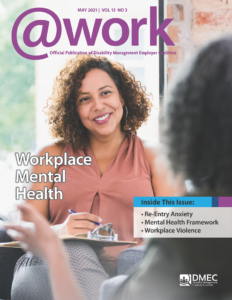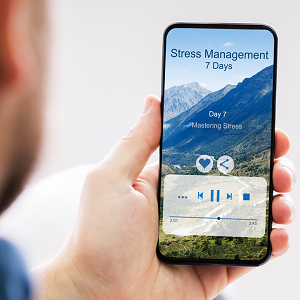
May 2021
Workplace Mental Health
Even before COVID-19 hit, America’s mental health crisis was exacting a heavy toll on individuals, families, communities, and the workplace. Over the last year, the pandemic has increased the levels of stress, anxiety, and depression for many employees. This issue of @Work magazine explores practical strategies for addressing mental health, "re-entry anxiety", workplace violence, bereavement, and much more.
Features
Helping Employees Battle “Re-Entry Anxiety” in a Post-Pandemic Workplace
With no immediate end to this pandemic in sight and uncertainty ruling our daily lives, a return to so-called “normal” continues to be elusive. COVID-19 redefined normal daily activities and, while we may long for a return to the life we knew pre-quarantine, re-entering the public domain and the workplace elicits another level of fear and apprehension. Read more.

A Four-Part Framework for a Mental Health-Friendly Workplace
It behooves organizations to proactively draw from documented best practices on workplace mental health to support all employees, as well as their families. For all organizations, the Employer Assistance and Resource Network on Disability Inclusion (EARN) provides the “4 A’s of a Mental Health-Friendly Workplace” framework as a vital roadmap. Read more.

Key Tools and Program Components to Prevent Workplace Violence
Far too often workplace violence intervention scenarios focus on what to do as an event unfolds and fail to adequately address interventions before an incident occurs. The best way to get out of a violent situation is to avoid getting into one to begin with. Prevention is always more effective than response. Read more.

Spotlight Articles
Program Showcase: High-Performance Cultures
When you think of a high-performance work culture, do you imagine all the pressure in an organization to be better, faster, or more efficient? Despite those associations, research suggests that high-performance cultures may be just the work-around needed to counter the inevitable stress and pressures that naturally pop up in workplaces. Read more.

RTW Showcase: Bereavement Leave
Employers should consider many practices for supporting individuals transitioning back to the workplace after the death of a loved one and over the long-term, as the grieving process can last and take many forms over subsequent weeks, months, and even years. Read more.

Columns
Absence Matters: Impact of COVID-19 on Mental Health
Exposure to COVID-19 continues to loom large in the workplace, and many project it will leave a lasting imprint long after vaccinations have been administered. While the medical community learns more about the virus each day, one phenomenon that is garnering increased attention is a condition called post-acute COVID-19 syndrome. Read more.

Integrated Absence Management: Vocational Strategies
Working from home has advantages, but common problems include loneliness, isolation, less supervision and feedback, expectations of being always available, longer hours, and feeling burned out. These stresses can cause anxiety, poor productivity, and job dissatisfaction, and they can exacerbate physical and mental health problems. Read more.

Engaging Today's Workforce: Make Wellness a Standard Business Practice
If the pandemic has taught us anything, it’s that employee benefits must go beyond the basics. In pursuing improved mental wellness across their organizations, employers must implement programs that address a wide range of needs to support employee resilience during this uncertain time. Read more.

Employer Solutions: Apply Vigilance and Communication
Some mental health and medical experts are raising awareness over a second pandemic: crisis fatigue. Whatever “back to normal” means, we may be closer, but we’re not there yet. Staying on top of all this requires employer vigilance to maintain open lines of communication and honest conversations. Read more.

Featured Case: FMLA Abuse
Employers are right to exercise caution when terminating employees for abusing leave. Snyder v. E. I. DuPont de Nemours, Inc. and Company, however, gives employers an excellent roadmap for investigating suspected fraud under the Family and Medical Leave Act. Read more.

IAM Technology Tips: Mental Health Technology
During the transformation of all aspects of our society over the past year, mental health technology benefits have adapted with the changes. Now more than ever, people are turning to their employers for assistance in accessing different types of mental health support. Read more.

Leave Management By the Numbers: Healthcare Leave Trends
LHC Group invested in their in-house leave program to take a data-driven approach that allows them to report on leave metrics and their case management efficiency. This article reviews their approach to gathering and assessing the first full year of data. Read more.

Common Sense Compliance: Mental Health Support Considerations
Employers play a critical role in providing mental health benefits and must be aware of how stress-inducing events impact employees. During the pandemic, workers have faced adjustments to remote work, school and daycare closures, or loss of a coworker or family member to COVID-19. Read more.

RTW & Disability: Soothe RTW Anxiety
Returning to work during the pandemic can cause serious anxiety for employees. By utilizing specific strategies, absence management professionals can alleviate these fears, help their company create a safe workplace, and make the process of returning less stressful for everyone. Read more.

The Disabled Workforce: Managing the Health of Your HR Team
HR leaders simply have not had the time to remember that one of the most powerful retention tools is recognition. Experts agree that recognition doesn’t work when it’s just about paying people more. The power of recognition happens when employers provide more autonomy, reward with professional development opportunities, and publicly recognize individuals. Read more.

Departments
The CEO's Desk: The Second Pandemic
We were at a mental health tipping point prior to the pandemic, and it will be wise for employers to get ahead of the tidal wave or “second pandemic” about to hit the workforce when we get to the “next normal”. Currently 40% of U.S. adults report struggling with mental health issues associated with the pandemic. Read more.

Employer Perspective: Compassion and Empathy
As absence and disability management professionals, we must be skillful at what we do. We must provide information, guidance, and support at challenging points in our employees’ lives. We must be patient when an employee is confused, scared, or needs help. And through all of this, we must remember to communicate with compassion. Read more.

DMEC News: May 2021
In our ever-changing world, we understand the importance of connection — networking continually ranks as one of the most valuable DMEC member benefits. To make it a little easier, we're pleased to introduce DMECommunities, our new online networking platform. Read more.

Compliance Memos: May 2021
The May 2021 compliance memos cover the expansion of the RETAIN initiative, a workers' compensation case that didn't satisfy the FMLA, and a case where a schedule change was not a reasonable accommodation. Read more.





